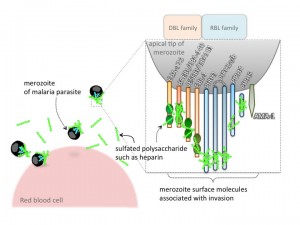How sulfated polysaccharides inhibit malaria Potential for novel antimalarial drug development


© Kentaro Kato. In host cell invasion, sulfated polysaccharides such as heparin bind to the apical surface of merozoites (left figure). On the apical surface of merozoites, a variety of molecules are expressed and interact with receptors on the erythrocyte surface. Heparin binds to DBL and RBL family proteins, which are representative molecular families associated with erythrocyte invasion (right figure). This result suggests that, in the presence of heparin, interaction between the apical tip of merozoites and the erythrocyte surface is inhibited and fails to mediate invasion.
Malaria is an infectious disease mediated by Anopheles mosquitoes and a major public health problem all over the world and especially in tropical areas. Many types of drugs for prevention or treatment of malaria have been developed, but attempts to develop effective vaccines have so far failed. However, development of novel types of drugs is desired because the drug-resistant parasites have emerged. In addition, while it had been reported that sulfated polysaccharides such as heparin suppress the growth of malaria parasites, the mechanism of action remained unknown.
Associate Professor Kentaro Kato and his group at the University of Tokyo and Obihiro University of Agriculture and Veterinary Medicine, have demonstrated that sulfated polysaccharides such as heparin bind to surface molecules on the merozoite stage of malaria parasites, strongly inhibiting host cell invasion.
This research advances our basic understanding of the mechanism by which sulfated polysaccharides and similar molecules act to inhibit the progression of malaria. It is hoped that any artificially created compounds that function in the same way should prove powerful antimalarial drugs.
Press release (Japanese)
Paper
Kyousuke Kobayashi, Ryo Takano, Hitoshi Takemae, Tatsuki Sugi, Akiko Ishiwa, Haiyan Gong, Frances Recuenco, Tatsuya Iwanaga, Taisuke Horimoto, Hiroomi Akashi, and Kentaro Kato,
“Analyses of interactions between heparin and the apical surface proteins of Plasmodium falciparum”,
Scientific Reports Online Edition: 2013/11/12(Japan time), doi: 10.1038/srep03178.
Article link
Links
Graduate School of Agricultural and Life Science
Department of Veterinary Medicine, Graduate School of Agricultural and Life Science
Laboratory of Veterinary Microbiology, Graduate School of Agricultural and Life Science (Japanese)







